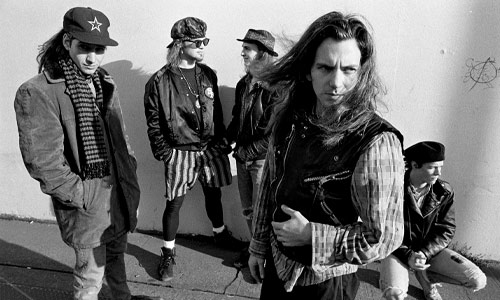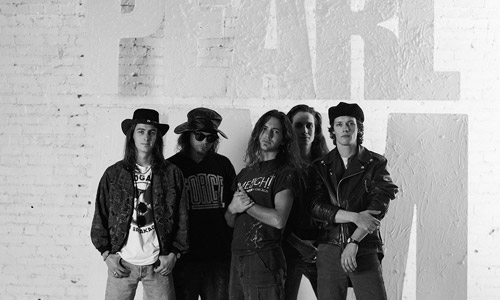- March 24, 2024
Pearl Jam’s debut album “Ten” ignited a musical revolution in 1991, epitomizing the raw emotion and power of grunge. Laden with anthems like “Alive” and “Jeremy,” it captivated audiences with Eddie Vedder’s haunting vocals and poignant lyrics. “Ten” remains a timeless masterpiece, shaping a generation’s musical landscape and cementing Pearl Jam’s status as one of rock’s most iconic bands.

Pearl Jam’s Debut Album Ten
Pearl Jam’s debut album, Ten, released on August 27, 1991, emerged from the ashes of Seattle’s vibrant music scene, blending elements of grunge, alternative rock, and punk. Despite its initial reception, it has since cemented its place as one of the most influential American rock albums of all time. With its raw emotion, powerful lyrics, and unforgettable melodies, Ten captivated listeners then and continues to do so three decades later.
The 90s Seattle Grunge Movement
In the labyrinthine alleys of Seattle’s underground music scene, a seismic shift was brewing in the mid-1980s, incubating what would soon detonate as the global explosion of “grunge.” Bands like Soundgarden, The U-Men, and Green River were forging a path, driven by a primal, unadulterated sound that spat in the face of mainstream rock’s polished veneer. Within this crucible of creativity, labels such as C/Z Records and Sub Pop Records provided fertile soil for these trailblazing acts, nurturing a subculture that was on the brink of captivating the world.
Green River and Malfunkshun: Forging the Sound of Seattle
Amidst this sonic maelstrom, Green River and Malfunkshun emerged as harbingers of the Seattle sound, unwittingly laying the groundwork for the birth of Pearl Jam. Formed in 1984, Green River fused elements of hard rock and post-hardcore punk, exuding a sinister, raw energy that left an indelible mark on the scene. Despite internal strife leading to their demise in 1987, members Stone Gossard and Jeff Ament became architects of the future, sowing the seeds of a musical revolution.
Meanwhile, Malfunkshun, fronted by the enigmatic Andrew Wood, injected a dose of glam-punk theatrics into the burgeoning scene. Despite their divergent styles, the symbiotic relationship between Malfunkshun and former Green River members would prove pivotal in the formation of Pearl Jam, laying the groundwork for what was to come.

The Tragic Saga of Mother Love Bone
In the wake of Green River’s disintegration, Stone Gossard, Jeff Ament, and Andrew Wood united with Bruce Fairweather and Greg Gilmore to birth Mother Love Bone. Unlike their predecessors, Mother Love Bone chased commercial success, inking a deal with Polygram and unleashing their debut EP, “Shine,” upon the world in 1989. Yet, fate dealt a cruel hand in 1990 when Andrew Wood fell prey to a fatal heroin overdose, mere days before the release of their inaugural album, “Apple.” His premature demise not only spelled the end of Mother Love Bone but also set the stage for the emergence of Pearl Jam, casting a long shadow over the Seattle music scene.
Temple of the Dog: A Eulogy in Sound
In the aftermath of Andrew Wood’s tragic passing, members of Soundgarden and Mother Love Bone convened to mourn their fallen comrade. Chris Cornell, alongside Stone Gossard, Jeff Ament, and others, formed Temple of the Dog, weaving a musical tapestry that would become a cornerstone of the Seattle scene. It was during this period that Stone Gossard and Jeff Ament commenced their collaboration with guitarist Mike McCready, laying the groundwork for what would soon manifest as Pearl Jam.
Pearl Jam’s Inception: A Phoenix Rising from Ashes
As Temple of the Dog paid homage to the fallen, Stone Gossard and Jeff Ament were already sculpting the contours of their next endeavor. With the addition of Mike McCready’s virtuosic guitar work, the trio embarked on a sonic odyssey that would redefine the musical landscape. Enter Eddie Vedder, whose soul-stirring vocals and introspective lyricism breathed life into the embryonic ensemble. From the ashes of tragedy emerged a phoenix, as Pearl Jam embarked on a journey that would reverberate through the annals of rock history.

The Birth of Pearl Jam and the Release of Ten
The origins of Pearl Jam trace back to the dissolution of several Seattle bands, including Green River and Mother Love Bone. Guitarist Stone Gossard and bassist Jeff Ament, along with guitarist Mike McCready, began crafting songs while searching for a vocalist and drummer. Enter Eddie Vedder, a singer living in San Diego who received a demo tape from the band. Vedder’s addition solidified the lineup, and they entered London Bridge Studios as Mookie Blaylock to record their debut album.
Ten was completed by mid-1991, and upon its release, it failed to make a significant impact commercially. However, its significance grew over time, especially in the wake of Nirvana‘s explosive success with Nevermind. The album’s raw energy and introspective lyrics resonated deeply with audiences, earning it a place among the greatest rock albums of all time.
Exploring the Songs of Ten
“Once”
The album kicks off with the ominous instrumental drone of “Master/Slave,” seamlessly transitioning into the frantic riff of “Once.” This song, part of the “Momma-Son Trilogy,” showcases Vedder’s intense vocals and introspective lyrics. As he confronts inner turmoil, lines like “You think I got my eyes closed, I’ve been looking at you the whole fucking time” reveal a raw vulnerability beneath the surface aggression.
I admit it, what’s to say
I’ll relive it, without pain
Backstreet lover on the side
Of the road
I got a bomb in my temple that is gonna explode
I got a .16 gauge buried under my clothes, I play
Once upon a time I could control myself
Once upon a time I could control myself
Oh try and mimic, what’s insane
I am in it, where do I stand?
Indian summer I hate the heat
I got a backstreet lover on the passenger seat
I got my hand in my pocket so determined discreet, I pray
– Once/Pearl Jam
“Even Flow”
“Even Flow” delves into the plight of the homeless, underscored by a blues-influenced groove and Vedder’s impassioned delivery. The song’s social commentary is evident as Vedder addresses the audience during a live performance, highlighting the humanity of those often marginalized by society.
“I thought I’d throw in a bit of street education while you still have an open mind….Right across the street there’s a little homeless community that lives under the bridge. You should just know that those people ain’t all crazy and sometimes it’s not their fault. This song is called ‘Even Flow’.” — Eddie Vedder before playing Even Flow live, 1994.
Freezin’
Rests his head on a pillow made of concrete . . . again
Oh, feelin’
Maybe he’ll see a little betters, any days
Oh, hand out
Faces that he sees time again ain’t that familiar
Oh, dark grin
He can’t help, when he’s happy, he looks insane
Even flow, thoughts arrive like butterflies
Oh, he don’t know, so he chases them away
Oh, someday yet he’ll begin his life again
Life again, life again
Kneelin’
Lookin’ through the paper though he doesn’t know to read
Oh, prayin’
Now to something that has never showed him anything
Oh, feelin’
Understands the weather of the winter’s on its way
Oh, ceilings
Few and far between all the legal halls of shame
“Alive”
The haunting opening riff of “Alive” sets the stage for Vedder’s deeply personal lyrics, exploring themes of identity, family, and resilience. Written amidst revelations about his biological father, the song’s chorus serves as a powerful affirmation of survival amidst adversity.
“In the original story, a teenager is being made aware of a shocking truth that leaves him plenty confused…It was a curse — ‘I’m still alive.’” The audience’s response to the song is what has brought about the change in meaning for Vedder. “They lifted the curse. The audience changed the meaning for me.”- Eddie Vedder
“Son,” she said, “have I got a little story for you
What you thought was your daddy was nothing but a
While you were sitting home alone at age thirteen
Your real daddy was dying
Sorry you didn’t see him, but I’m glad we talked”
“While she walks slowly across a young man’s room
She said, “I’m ready for you”
Why I can’t remember anything to this very day
‘Cept the look, the look
Oh, you know where, now I can’t see I just stare”— “Alive”/Pearl Jam
“Why Go”
With its raucous energy and pointed lyrics, “Why Go” confronts the stigma surrounding mental health treatment. Vedder’s impassioned vocals lend urgency to the narrative, shedding light on the institutional failures that perpetuate suffering.
“The song ‘Why Go’ was written about a specific girl in Chicago… I think her mom caught her smoking pot or something. She was about 13 years old and she was just fine. I think her mom thought she had some troubles when I think it was really maybe the parents that were having troubles and the next thing you know, this young girl was in a hospital. They kept her there for quite a long time. She was so strong that she refused to accept many of the accusations of her doing terrible things when she wasn’t really doing anything and the next thing you know, she’d been hospitalized for like two years. The fact is that this is going on all over the place and this insurance thing that goes on with hospitals and insurance and these kind of counseling… prisons that they set up and it’s really something that I think is really addressed subliminally in the song, but it has to be addressed on a bigger level. It happens everywhere and I just hope that someday we’re able to change the fact that it is happening.” — Eddie Vedder
“She scratches a letter
Into a wall
Made of stone
Maybe someday another child
Won’t feel as alone as she does
It’s been two years and counting
Since they put her in this place
She’s been diagnosed
By some stupid fuck
And mommy agrees, yeah” — “Why Go”/Pearl Jam
“Black”
“Black” stands as a testament to lost love and regret, with Vedder’s soulful vocals conveying a sense of longing and resignation. Despite its popularity, the band resisted releasing it as a single, wary of being pigeonholed by its emotional intensity.
“Black is one of the fragile songs that get crushed by the business. I don’t want to be a part of it. I don’t think the band wants to be part of it.”-Eddie Vedder
“All the love gone bad turned my world to black
Tattooed all I see, all that I am, all I’ll be, yeah
Mm, mm, ooh
I know someday you’ll have a beautiful life
I know you’ll be a star in somebody else’s sky, but why
Why, why can’t it be, oh, can’t it be mine?
Ooh, ah yeah, ah, ooh” — “Black”/Pearl Jam
“Jeremy”
Inspired by real-life tragedies, “Jeremy” tackles the devastating impact of school shootings with a blend of empathy and urgency. Vedder’s evocative storytelling and the song’s anthemic chorus propelled it to mainstream success, sparking important conversations about mental health and societal violence.
“It came from a small paragraph in a paper which means you kill yourself and you make a big old sacrifice and try to get your revenge. That all you’re gonna end up with is a paragraph in a newspaper. Sixty-four degrees and cloudy in a suburban neighborhood. That’s the beginning of the video and that’s the same thing in the end; it does nothing … nothing changes. The world goes on and you’re gone. The best revenge is to live on and prove yourself. Be stronger than those people. And then you can come back.” said Vedder.
He went on to say “I actually knew somebody in junior high school, in San Diego, California, that did the same thing, just about, didn’t take his life but ended up shooting up an oceanography room. I remember being in the halls and hearing it and I had actually had altercations with this kid in the past. I was kind of a rebellious fifth-grader and I think we got in fights and stuff. So it’s a bit about this kid named Jeremy and it’s also a bit about a kid named Brian that I knew and I don’t know…the song, I think it says a lot. I think it goes somewhere…and a lot of people interpret it different ways and it’s just been recently that I’ve been talking about the true meaning behind it and I hope no one’s offended and believe me, I think of Jeremy when I sing it.”- Eddie Vedder
“Clearly I remember
Pickin’ on the boy
Seemed a harmless little fuck
But we unleashed the lion
Gnashed his teeth and bit the recess lady’s breast
How could I forget
And he hit me with a surprise left
My jaw left hurting
Dropped wide open
Just like the day
Oh, like the day I heard” — “Jeremy”/Pearl Jam
“Oceans”
“Oceans” offers a departure from the album’s heavier themes, embracing a lighter, more atmospheric sound. Vedder’s introspective lyrics and the band’s ethereal instrumentation create a sense of serenity amidst the album’s emotional turmoil.
“I remember for “Oceans”, someone asked me to put change in the parking meter for them. I went and did that and then I came back and was locked out. It was drizzling and I wasn’t dressed for an outing in the rain. I had a scrap of paper and a pen in my pocket, and they were playing this song [inside]. All I could hear was the bass coming through the wall, this window that was boarded up. So I wrote the song to the bass. I wasn’t even listening to hear the song at first. When I heard a break, I’d start pounding on the door…trying to get out of the rain. So as I was doing that, I thought, fuck it, I might as well write something.”- Eddie Vedder
“Hold on to the thread
The currents will shift
Glide me towards you
know something’s left
And we’re all allowed
To dream of the next
Oh,
oh the next, time we touch” — “Oceans”/Pearl Jam
“Porch”
As one of the album’s most aggressive tracks, “Porch” channels Vedder’s angst and frustration into a blistering sonic assault. The song’s confrontational lyrics and frenetic energy showcase Pearl Jam’s punk influences, marking a departure from the album’s more introspective moments.
“Porch,” one of Pearl Jam’s early songs, was written by lead singer Eddie Vedder during his journey from San Diego to meet the band for the first time. It’s a fan favorite, often performed live.
Vedder’s stance on abortion became linked to the song after he wrote “Pro Choice” on his arm during Pearl Jam’s MTV Unplugged concert in 1992. This sentiment was reinforced when Vedder wore a T-shirt with a wire hanger on it during their Saturday Night Live performance and added the lyrics: “A woman has every right to choose… Choose for herself.”
Reflecting on the recording of their debut album, Ten, founding member Jeff Ament told Uncut magazine in March 2009: “We went to Michael Goldstone at Sony and said, We don’t want to spend a lot of money making this record, we want to get out and play, do it the way were comfortable, doing it with somebody local.”
Ament recalled the recording sessions at London Bridge in Seattle, spanning a day or two each, followed by the recording of the album proper, incorporating new songs like “Deep,” “Jeremy,” and “Porch.” The process began around March or April of 1991, amidst rare snowfall in Seattle, confining the band to their basement studio. Ament remembers: “I remember there being a lot of snow on the ground, which is pretty rare for Seattle. We were stuck in the city, stuck in our basement.”
“Hear my name
Take a good look
This could be the day
Hold my hand
Lie beside me
I just need to say
What can I take?
I just want to be
I know that i would not ever touch you
Hold you
Feel you
Ever hold
Never again” — “Porch”/Pearl Jam
“Garden”
With its dreamy guitars and enigmatic lyrics, “Garden” invites listeners into a world of introspection and ambiguity. Vedder’s haunting vocals and the band’s ethereal instrumentation create a sense of melancholic beauty that lingers long after the song has ended.
The song delves into facing mortality without seeking solace in religion’s promises. It depicts a cemetery as the “garden of stone,” where the narrator, having lost faith, confronts existential questions.
The lyrics reject ponderings about existence, prioritizing the present moment. Despite accepting death’s finality, there’s a resolve to live fully until the end.
Imagery of walking with hands bound and face bloodied signifies a defiant march into the inevitable, highlighting human solitude. The refrain asserts autonomy, with the narrator neither seeking nor needing external validation.
In the end, there’s a declaration of indifference towards religious comfort, emphasizing self-sufficiency in navigating life’s uncertainties.
“I will walk with my hands bound
I will walk with my face, blood
I will walk with my shadow flag
Into your garden, garden of stone
After all is done and we’re still alone
I won’t be taken, yet” — Garden/Pearl Jam
“Deep”
“Deep” delves into themes of addiction, despair, and existential angst, with Vedder’s searing vocals and the band’s dynamic instrumentation capturing the song’s emotional intensity. Its raw energy and chaotic structure reflect the album’s overarching sense of unease and disillusionment.
“Deep” encapsulates the prevalent themes of sadness, anger, and existential confusion found throughout Pearl Jam’s album “Ten.” In the opening verse, Eddie Vedder’s lyrics poignantly address the struggles of a drug addict devoid of hope.
The song confronts dark subjects like drug addiction, suicide, and even rape, making it emotionally intense and unsuitable for sensitive listeners. However, it serves as a stark illustration of the dramatic shift occurring in rock music during the early 90s, departing from the bubblegum pop dominating the airwaves at the time. It heralded a rapid evolution in musical content and tone.
“On the edge, a windowsill
Ponders his maker, ponders his will
To the street below, he just ain’t nothing
But he’s got a great view
And he sinks the needle deep, yeah
Oh, can’t touch the bottom
In too deep, yeah
Uh-huh, can’t touch the bottom”-Deep/Pearl Jam
“Release”
Closing out the album, “Release” stands as a poignant tribute to Vedder’s father and a reflection on grief, acceptance, and healing. Its stripped-down arrangement and heartfelt lyrics offer a cathartic conclusion to Ten, leaving listeners with a sense of closure and renewal.
“Release” emerged from guitarist Stone Gossard’s evocative riff, evolving into a poignant anthem for Pearl Jam. Eddie Vedder, drawing from personal turmoil, poured out lyrics reflecting on his familial struggles and the band’s shared grief over Andrew Wood’s death. Vedder noted, “We were strangers, but we were coming from a similar place,” emphasizing the song’s role in fostering unity among the band members amid their individual hardships.
“I see the world, feel the chill
Which way to go, windowsill
I see the words on a rocking horse of time
I see the birds in the rain
Oh, oh
Oh, oh
Oh, dear Dad, can you see me now?
I am myself, like you somehow
I’ll ride the wave where it takes me
I’ll hold the pain, release me
Oh, oh I
Oh, oh
Oh, dear Dad, can you see me now?
I am myself like you somehow
I’ll wait up in the dark for you to speak to me
How I’ve opened up, release me
Release me, release me, ah, release me
Oh, oh I
Oh, whoa, ah ooh, ooh” — Release/Pearl Jam
Reflections on Ten
Ten is more than just an album; it’s a sonic journey through the complexities of human emotion and experience. Each track offers a glimpse into the band’s collective psyche, weaving together themes of love, loss, identity, and social commentary. From the raw energy of “Once” to the introspective beauty of “Release,” Ten transcends its grunge roots to touch the hearts and minds of listeners across generations.
Pearl Jam’s debut album not only helped define the grunge era but also laid the groundwork for the band’s enduring legacy. Its success paved the way for future releases, solidifying Pearl Jam’s status as one of the most important rock bands of the 1990s and beyond. As the album approaches its 30th anniversary, its impact continues to reverberate through the music industry, inspiring countless artists and resonating with fans around the world.
In an era dominated by manufactured pop acts and fleeting trends, Ten stands as a testament to the power of authenticity and artistic integrity. Its raw emotion and unflinching honesty remind us of the cathartic power of music to heal, inspire, and unite us in our shared humanity. As we revisit Ten three decades later, it serves as a timeless reminder of the enduring power of rock ‘n’ roll to transcend boundaries and speak to the soul.
Ten Remains One Of The Best Debut Albums Ever
Thirty-three years since its release, Ten remains a landmark achievement in rock music, showcasing Pearl Jam’s raw talent and uncompromising vision. Through its introspective lyrics, dynamic instrumentation, and emotional depth, the album continues to resonate with audiences around the world, cementing its status as a timeless classic. As listeners continue to rediscover its power and relevance, Ten stands as a testament to the enduring legacy of Pearl Jam and the transformative power of music.
Stay Updated With Breaking Recording Artist News, Tour Announcements, Weekly Featured Concert Tickets and subscribe to our YouTube Channel to stay connected with your favorite artists.
